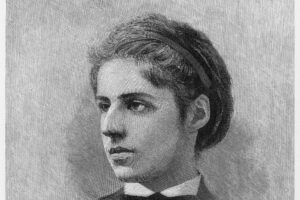A mighty woman with a torch, whose flame
Is the imprisoned lightning, and her name
Mother of Exiles.
INTRODUCTION

Emma Lazarus (1849-1887) was born into a large and wealthy Jewish family in Manhattan in the 1840s. Some of her ancestors had escaped from religious persecution in Portugal to Dutch-controlled New Amsterdam (later New York) as early as the seventeenth century. Others immigrated to the United States from German provinces in the eighteenth century. But by the time of the American Civil War, Lazarus was well educated and surrounded by social power and influence. Her father helped publish her earliest poetry, while she was still a teenager. The famous public intellectual Ralph Waldo Emerson later became one of her mentors and influences. But by her early thirties, Lazarus also developed a notable commitment to social justice, especially for Jewish refugees and immigrants. Originally asked to write a poem to help raise funds for the pedestal of the new Statue of Liberty (a gift from France honoring the abolition of slavery and dedicated in 1886), Lazarus decided to produce a sonnet (14-line poem) extolling America not just as a free land but also as a beacon for exiles. This 1883 poem, “The New Colossus,” then became popular and later engraved on the Lady Liberty’s pedestal in 1903.
SOURCE FORMAT: Poem
WORD COUNT: 105 words
RELATED TEXTS: Harper poem (1858) // Popel poem (1934) // Gorman poem (2021)
CONTEXT LECTURE:
Not like the brazen giant of Greek fame,
With conquering limbs astride from land to land;
Here at our sea-washed, sunset gates shall stand
A mighty woman with a torch, whose flame
Is the imprisoned lightning, and her name
Mother of Exiles. From her beacon-hand
Glows world-wide welcome; her mild eyes command
The air-bridged harbor that twin cities frame.
“Keep, ancient lands, your storied pomp!” cries she
With silent lips. “Give me your tired, your poor,
Your huddled masses yearning to breathe free,
The wretched refuse of your teeming shore.
Send these, the homeless, tempest-tost to me,
I lift my lamp beside the golden door!”
